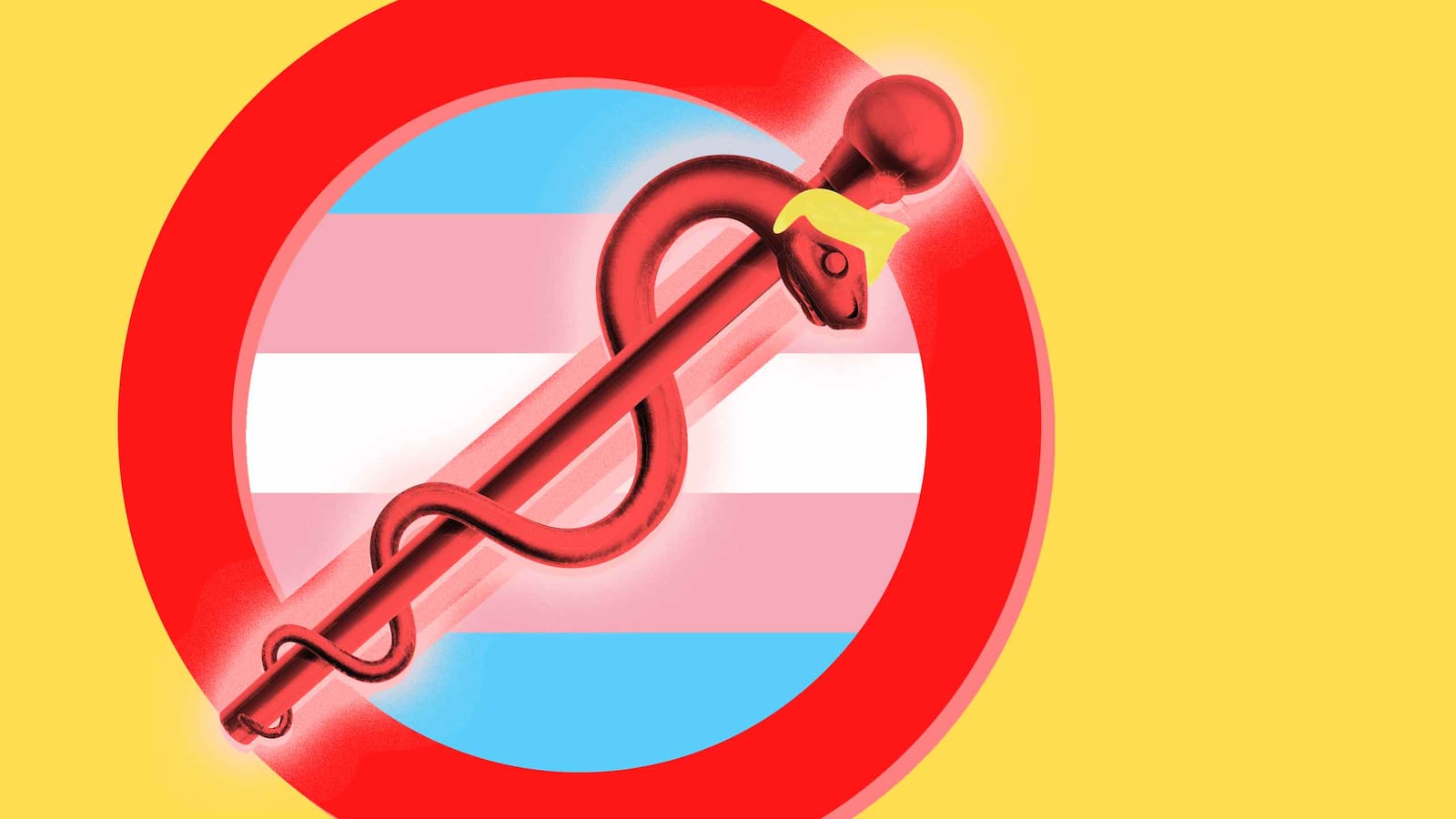On Thursday, the U.S. Department of Health and Human Services announced a new Conscience and Religious Freedom Division to be housed within the HHS Office for Civil Rights.
What that means, in effect, is that the federal department whose stated mission is to “enhance and protect the health and well-being of all Americans” will now make it even easier for health care providers to discriminate against some Americans, particularly LGBT people and especially transgender people.
In introducing the new division at a press conference Thursday morning, OCR Director Roger Severino—who, as The Daily Beast previously reported, has a long history of anti-LGBT comments and actions—opened with a childhood story about reading a “World War II book” with “very vivid black-and-white photographs” of shoes that had Hebrew writing inside them, with the caption noting that Nazis forced Jews to wear them during the Holocaust as an insult to their faith.
Shortly thereafter, Severino announced that “health care, especially with the Office of Civil Rights at HHS, is the next area where the issues of conscience—and the issues of life and death—are coming to the fore.” The indirect Holocaust comparison was not lost on the Human Rights Campaign, which promptly labeled his comments “outrageous.”
What the new Conscience and Religious Freedom Division does not do is create any new major new law or policy regarding the provision of health care to LGBT people, or to women seeking abortions and contraceptive care.
Rather, the division—as described in a Thursday press release from HHS—exists primarily to shore up the OCR’s preexisting “enforcement authority over federal conscience protection statutes.” (The Trump administration previously issued a rule to HHS regarding “conscience rights” in October of last year.) “Laws protecting religious freedom and conscience rights are just empty words on paper if they aren’t enforced,” Severino said in the press release. “No one should be forced to choose between helping sick people and living by one’s deepest moral or religious convictions, and the new division will help guarantee that victims of unlawful discrimination find justice.”
The new division’s sparse website has a prominent link to file a “conscience or religious freedom complaint” directly to the OCR in the event that “a covered entity discriminated against you (or someone else) on the basis of conscience or religious freedom.” The more general complaint portal on the OCR website, by comparison, only lists the categories of “race, color, national origin, disability, age, sex, or religion”—and noticeably not sexual orientation or gender identity.
LGBT and civil rights groups see the new division as a clear attempt to allow anti-LGBT discrimination in health care settings to continue. If not a shift in actual policy, the new division appears to be, at the least, a placing of emphasis. (The HHS did not immediately respond to The Daily Beast’s request for comment on LGBT groups’ concerns about the new division.)
“LGBTQ people need the Department of Health and Human Services to enforce non-discrimination protections in federal health programs,” HRC Legal Director Sarah Warbelow said in a statement. “The creation of an unnecessary new division that is likely to promote a license to discriminate diverts needed enforcement resources and encourages discrimination against LGBTQ people.”
Indeed, LGBT people already face widespread discrimination in health care settings—and even if the Trump administration hadn’t taken this action, it would still continue unabated at shocking rates.
According to the 2015 U.S. Transgender Survey—prepared by the National Center for Transgender Equality—one third of respondents who had visited a doctor’s office in the last year reported having “at least one negative experience related to being transgender,” like being denied treatment or experiencing verbal harassment. Eight percent said that they had been refused transition-related health care, even though it is supported by virtually every major medical association, and 23 percent said that they had avoided going to the doctor “because of fear of being mistreated as a transgender person.”
And a new 2017 survey from the Center for American Progress confirms that discrimination in the doctor’s office remains a problem for the LGBT community more broadly, not just for transgender people. That nationally representative survey found that eight percent of lesbian, gay, bisexual, and queer respondents reported that a health care provider had “refused to see them because of their actual or perceived sexual orientation.” And nine percent said they had been on the receiving end of “harsh or abusive language” while receiving medical treatment.
The CAP data also underscores the rampant nature of anti-transgender discrimination in health care settings, finding that 29 percent of transgender respondents reported that a provider had turned them away “because of their actual or perceived gender identity” and another 29 percent reporting “unwanted physical contact” from a provider like “fondling, sexual assault, or rape.”
The LGBT community might be a small fraction of the U.S. population—the latest Gallup estimates place its size at 10 million Americans—but that still means that hundreds of thousands of Americans are sometimes afraid to seek even basic health care because of who they are.
“Discrimination—and even the potential for discrimination—can deter LGBTQ people from seeking care in the first place,” the CAP report on that survey notes, citing the finding that 8 percent of LGBT respondents had “avoided or postponed needed medical care because of disrespect or discrimination from health care staff.”
And although the new Division of Conscience and Religious Freedom may not change much in practice about how the Trump administration is already operating with regard to LGBT issues, advocates say it sends yet another message to a community that already faces barriers when accessing medical care.
“We know that people will be denied care as a result because discrimination against LGBT people is already widespread and LGBT people have already been turned away from hospitals and doctors’ offices,” Lambda Legal CEO Rachel B. Tiven said in a statement. “The Orwellian ‘Conscience and Religious Freedom’ unit simply provides guidance on how they can try to get away with it.”






